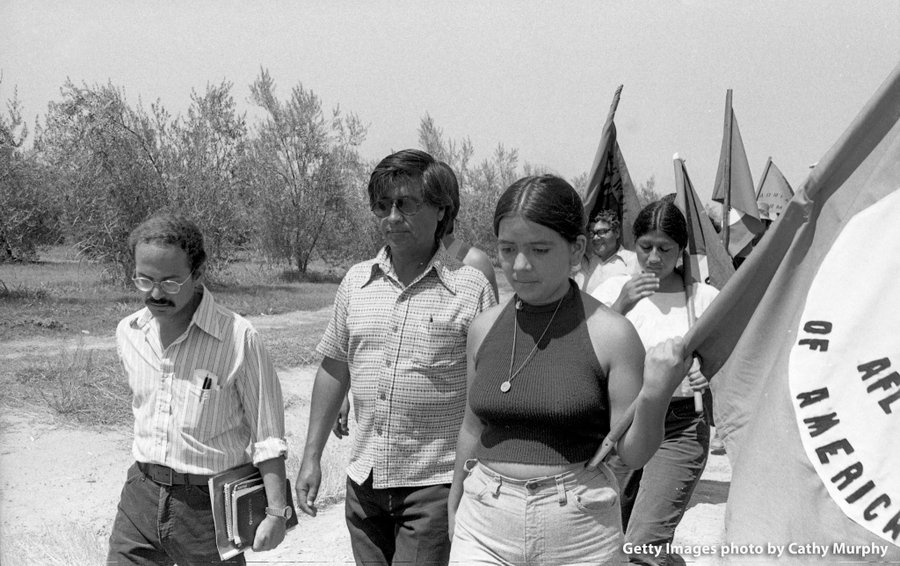Our Labor History: Cesar Chavez Leads "1,000 Mile March" for Farm-Worker Rights in California
July 31, 2024
 Summer 1975 - Cesar Chavez trekked more than 1,000 miles in 59 days leading a march up the coast of California to educate farm workers about their newly won right to unionize following the passage of the California Agricultural Labor Relations Act (CALRA). California Governor Jerry Brown signed CALRA into law on June 4, 1975, which protected farm workers’ right to unionize, collectively bargain, to vote in secret-ballot elections, and established the state’s Agricultural Labor Relations Board (ALRB). The National Labor Relations Act of 1935 specifically excluded agricultural workers from the protections of the Act, exclusions that remain in many states today.
Summer 1975 - Cesar Chavez trekked more than 1,000 miles in 59 days leading a march up the coast of California to educate farm workers about their newly won right to unionize following the passage of the California Agricultural Labor Relations Act (CALRA). California Governor Jerry Brown signed CALRA into law on June 4, 1975, which protected farm workers’ right to unionize, collectively bargain, to vote in secret-ballot elections, and established the state’s Agricultural Labor Relations Board (ALRB). The National Labor Relations Act of 1935 specifically excluded agricultural workers from the protections of the Act, exclusions that remain in many states today.
Cesar Chavez was born in Yuma, AZ in 1927 and grew up in a family of poor migrant Mexican- American farm workers. During the Great Depression his family lost their ranch and moved to California, where Chavez began working in the fields at the age of 11, witnessing the indignity and discrimination faced by agricultural workers.
He spent the following decades fighting for worker dignity and to improve the pay and working conditions for agricultural workers who, like his parents, kept food on peoples’ tables across America, despite often enduring their own hunger, poor working conditions, and starvation wages.
Chavez co-founded the United Farm Workers (UFW) union with Dolores Huerta in 1962 to advance “La Causa” (the cause), which was the movement to organize Mexican-American farm workers by bringing workers and their families together through community organizing.
Inspired by the nonviolent civil disobedience actions of Mahatma Gandhi and Martin Luther King Jr., Chavez started organizing workers in the 1950s, and spent the 1960s and 1970s organizing marches, boycotts, and fasting to draw attention to La Causa and justice for farm workers.
The UFW action that culminated in the passage of CALRA was its march to the E&J Gallo Winery in Modesto, CA on March 1, 1975. The UFW had represented Gallo grape workers since 1967, but their contract expired in 1973. After months of working without a contract, Gallo informed its workers and the UFW that they would no longer be represented by the UFW and would be represented by the Teamsters instead.
Gallo refused to hold a secret ballot representational election, despite calls from the workers. More than 85 percent of the workers walked off their jobs and the UFW called for a boycott of Gallo products. The strike and boycott remained in effect until 1978 when the UFW won its contract back.
Workers marched from San Francisco, Fresno, and Stockton to Modesto to bring attention to the boycott and to continue their calls for a union election. Chavez stated that it would last “for an eternity” unless the company allowed secret-ballot and representational elections for workers to make their own choice about which union would represent them. More than 15,000 people participated in the marches and rallies. The Modesto March brought national attention to the plight of farm-workers in the state, and it energized the state’s farm labor movement. Governor Jerry Brown was a longtime supporter of the UFW. Upon his election in 1974, Brown quickly began pushing for labor law reform. Farm owners, reluctant to continue fighting against the UFW, stopped resisting the proposed reforms and the CALRA was passed and signed into law. Chavez and the UFW celebrated the victory and informed workers of their rights by trekking more than 1,000 miles from the Mexican border along the coast to Salinas and then from Sacramento to the UFW’s La Paz headquarters near Bakersfield, CA. Tens of thousands of farm workers walked and rallied with Chavez to hear him speak and organize their ranches. ■



